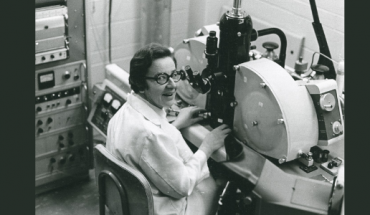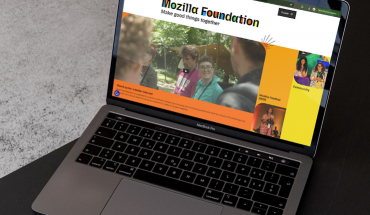‘I’ve put up with bullying, sexual harassment and trolling in these games forever. I’ve been a female gamer for like 18 years and that nonsense hasn’t changed.’
The comment is not unusual.
‘I showed some of the chats to a non-gaming friend; she was amazed. ‘People really talk like that?!?’ I told her that’s nothing; it’s just the tip of the iceberg.’
Remarks like these are sadly not hard to find.
Gamers of all stripes report disturbing levels of verbal toxicity, racism and abuse in online gaming culture. Massively multiplayer online games, or MMOGs, can bring lots of different gamers together in an online space where open mics for team communication and ongoing text exchanges often expose environment to much more than pure play and gaming strategy.
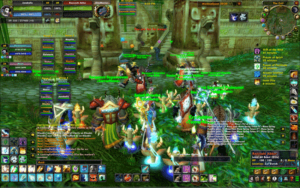
A screenshot from the MMOG World of Warcraft shows how in-game collaboration and “problem-solving” connects players. Other communication can be brought to bear.
Yes, many games are built on the idea of competition, warfare, battles, shootings and other mayhem. It’s the name of the game. The players expect that. But what is often not expected and not wanted is the verbal abuse that participants hurl at each other. Racist epithets, sexual taunts, profane insults and the like can ruin the experience for a gamer, undermining a sense of shared community and even causing the game publisher or platform operator loss of revenue, loss of prestige or loss of legal cover.
But an international movement to counter toxic behaviour in online gaming is underway, taking aim directly at gaming organizations and digital communities and getting them to do more to combat the toxicity in gaming. Organizers want to see a more open and inclusive gaming experience for everyone who wants to play, but they know that even the virtual community gamers join – much less the game they play – can expose them to harmful behaviour that shapes their online experience, maybe even impacts their offline life.
Melanin Gamers is the name of the movement, and its more than 4,000 current registered members from the global digital community are promoting awareness, education, diversity and inclusion in the video game industry. MG was founded by an active gamer who made it her mission to build a community where people could play together away from the racism, misogyny and homophobia sometimes associated with online games.
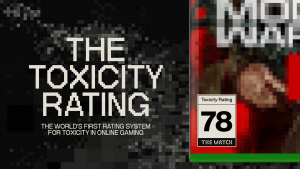 As part of its efforts, Melanin Gamers has unveiled a new toxicity rating system to identify and eliminate harmful verbal abuse in gaming culture.
As part of its efforts, Melanin Gamers has unveiled a new toxicity rating system to identify and eliminate harmful verbal abuse in gaming culture.
Like PG movie ratings, toxic online gaming environments will be rated and categorized in the system, known as The Watch. It lists many of the most played games and gives them a numerical toxicity rating, developed to offer parents and players alike more information about what to expect beyond the storylines of the games themselves.
Currently, video games are assigned age and content ratings by the Entertainment Software Rating Board (ESRB); the ratings tell more than three billion people (and their partners, parents or guardians) who play online games what to expect in terms of characters, storylines, and types of game play.
That’s a good start, says Annabel Ashalley-Anthony, founder of Melanin Gamers. But there are other factors to consider, such as how, when, and where toxic conversations can happen around game play. Sometimes aggressive profane language is encountered in ‘the lobby’, even before game play starts. ESRB ratings are for what happens in a game mode, not what happens online.
“This toxicity rating is hopefully another step forward as we look to transform the gaming culture and promote an environment built on the tenets of inclusivity, kindness, and respect,” Ashalley-Anthony explained. “My hope is that powerhouse gaming organizations such as the ESRB reset their approach to ratings and take these matters seriously.” Reached online while she was in Ghana (she and Melanin Gamers work from two bases, one in Africa, one in London England). She regularly speaks about topics related to women in gaming and participates in gaming panel discussion and workshops internationally.
The movement she launched to reform aspects of the gaming industry is built on personal and collective experiences that victims and witnesses of racial injustice in gaming have lived and shared. To create and sustain the toxicity list, Melanin Gamers worked with Leo Burnett Toronto, and The Angus Reid Group, to survey hundreds of gamers across some of the biggest gaming communities, asking about the kind or amount of toxicity they experienced while playing online.
Based on those responses, popular online games have been assigned ratings so that other gamers, their parents, and the general public can learn of the attitudinal combativeness gamers are exposed to while playing some of the biggest online games.
In the case of Call of Duty, for example, the incredibly popular and successful video game series and media franchise published by Activision, 78 per cent of respondents reported experiencing toxicity when playing the game online. Crude humour, racism, gender discrimination, sexual content and conversation about controlled substances were said to be prevalent, and each was rated by number.
Many online games do have their own internal reporting systems which players can use to flag that another player is cheating, and the publisher or operator will take appropriate actions if necessary. Rarely are updates or actions taken because of such reports announced or publicized.
But MG founder Annabel Ashalley-Anthony says an overhaul of the system is needed, so that the reporting of abuse is just as easy as reporting of cheating. “Cheating can cost the game maker money; abuse can cost, too,” she says pointedly. “Some games are unplayable, they’re so toxic. Gaming companies are losing players, losing money, as a result.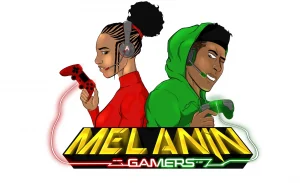
“Some of my friends stopped gaming altogether. It’s shame. Gaming is a space I advocate for; it’s a potentially very positive space. There’s value there above and beyond the game itself, as people come together and connect. That’s why we’re doing this. Most gamers are lovely; a few are very vocal. Like my Dad says, ‘The empty barrel makes the most noise.’
In addition to developing the new rating system, Ashalley-Anthony, Melanin Gamers, and The Watch are calling on major video game developers to enhance and adopt more in-game reporting mechanisms to help deliver immediate action against racism and contribute to lasting change in the video game industry so that it reflects and respects players from all walks of life.
# # #
Not mentioned by Melanin Gamers, but with an interesting mandate that overlaps in many ways, The Games Institute (GI) at the University of Waterloo in Ontario is advancing the study of interactive and immersive technologies and experiences, like online gaming.
In 2020, GI instituted a Committee on Anti-Racism, Decolonization, and Equity, Diversity, and Inclusion (ADE) specifically to build awareness and understating of issues of equity, diversity, and inclusion. Understanding that meaningful change in the games industry requires active and inclusive community-building, a series of speaker presentations and workshops was held to highlight the voices of individuals from marginalized groups. Their list included, but was not limited to, persons who are Black and/or Indigenous or otherwise racialized, women-identified, LGBTQ2S+, disabled and/or neurodivergent, and people from other under-represented communities.
-30-

